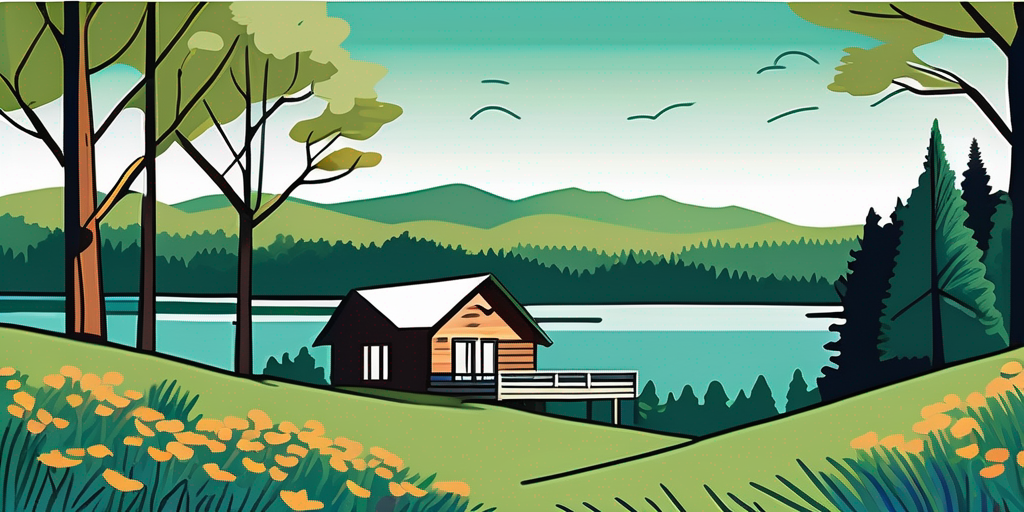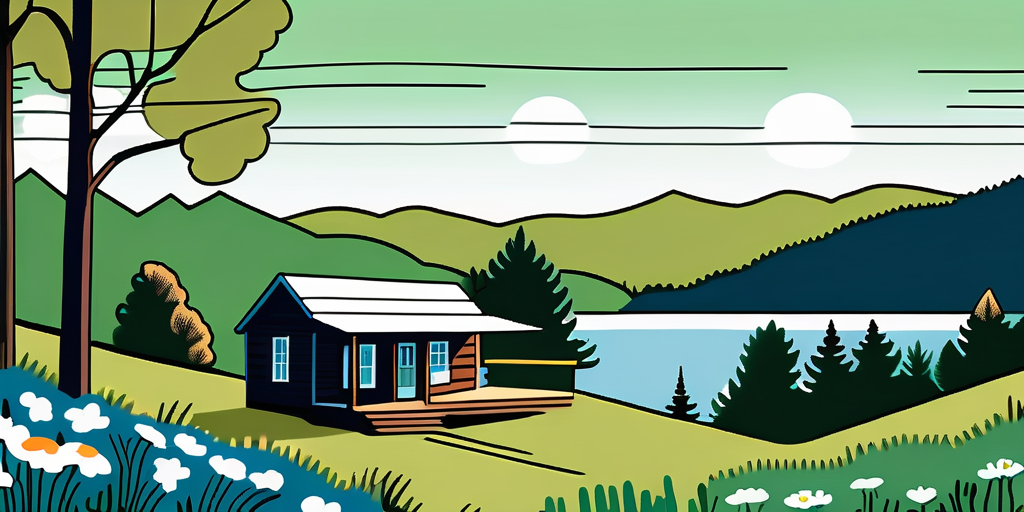
Are you dreaming of owning a slice of paradise in Tennessee? Whether it’s for weekend getaways, fishing trips, or simply escaping the hustle and bustle of city life, recreational property in Tennessee offers a unique blend of natural beauty and outdoor adventure. In this article, we’ll break down everything you need to know about buying recreational property in the Volunteer State.
Recreational property is land that primarily serves as a place for leisure activities like camping, fishing, hunting, and hiking. It can vary significantly in size and features, from small plots perfect for weekend camping to larger parcels for more extensive outdoor recreation. What sets recreational properties apart from standard residential or agricultural land is their intended use, which focuses on enjoyment and adventure rather than just as an investment or place of residence. These properties often feature unique landscapes, such as lakes, rivers, or mountainous terrains, making them ideal for a variety of outdoor pursuits. Whether you are an avid angler looking for a serene fishing spot or a family seeking a place to build a cabin, recreational properties offer a diverse range of options tailored to different interests.
The benefits of owning recreational property are many and varied. First and foremost, it serves as a personal retreat. Imagine escaping to your own wooded paradise whenever you need a break. This type of ownership allows you to enjoy nature without traveling far from home. The tranquility of being surrounded by trees, wildlife, and natural beauty can significantly reduce stress and enhance overall well-being. Furthermore, many recreational properties are located in areas with stunning views and abundant wildlife, providing an ever-changing backdrop for relaxation and adventure.
Additionally, recreational properties often come with potential income opportunities. Depending on the location and features, you might consider renting it out to friends or vacationers when you're not using it. This can help offset costs and even turn a profit. Many owners find that by listing their properties on vacation rental platforms, they can attract visitors looking for unique outdoor experiences. Lastly, owning recreational land can create lasting memories with family and friends, fostering a sense of belonging to the outdoors. Whether it's hosting summer barbecues, winter snowshoeing adventures, or simply gathering around a campfire under the stars, these shared experiences can strengthen bonds and create cherished stories that last a lifetime. The ability to personalize your space with cabins, fire pits, or even treehouses adds to the allure, making it a canvas for your family's adventures and traditions.
Tennessee boasts a diverse landscape, ranging from rolling hills to rugged mountains. Areas like the Great Smoky Mountains provide breathtaking views and countless trails for hiking and biking. If you’re more into flat, open spaces, the western part of the state near Memphis offers beautiful farmland and lush parks. The state's varied topography not only enhances its aesthetic appeal but also creates a multitude of recreational opportunities, making it a prime destination for outdoor enthusiasts.
The terrain plays a crucial role in your recreational enjoyment. For instance, if you plan to do a lot of hunting, properties that feature a mixture of open fields and dense woodlands are ideal. Furthermore, a property with elevation changes can enhance your experience, offering unique vantage points for wildlife watching and photography. Additionally, the rich soil in certain regions supports a variety of vegetation, which can attract diverse wildlife, further enriching your outdoor experience. Whether you prefer the serenity of a secluded mountain cabin or the vibrant life of a lakeside retreat, Tennessee's landscape offers something for everyone.
Another significant aspect to consider when looking for recreational property is its proximity to water bodies. Tennessee is known for its numerous lakes, rivers, and streams, making it a fantastic setting for fishing, kayaking, and swimming. Properties that provide waterfront access, like those near Norris Lake or the Tennessee River, can add considerable value and enjoyment. The state's waterways are not just for recreation; they also serve as vital ecosystems that support a rich array of aquatic life, making them perfect for both casual fishing and serious angling pursuits.
Wildlife is abundant in Tennessee, making it a haven for hunters and nature lovers alike. Knowing what types of wildlife inhabit the area can help you in your decision-making. Whether you’re interested in hunting deer, turkey, or fishing for trophy catfish, it’s essential to research the local fauna to ensure the property meets your recreational desires. Additionally, many properties are located near wildlife management areas, which can provide even more opportunities for observing and interacting with nature. Birdwatchers will also find Tennessee to be a treasure trove, as migratory paths cross through the state, attracting a variety of species throughout the year. The combination of water features and wildlife creates a dynamic environment that is both tranquil and exhilarating, perfect for those looking to immerse themselves in the great outdoors.
Before diving into a purchase, it's crucial to understand what influences the value of recreational property. Unlike traditional real estate, recreational land values can fluctuate based on various factors, including location, accessibility, and available amenities.

For example, properties near popular tourist destinations or outdoor attractions often hold higher value. Additionally, utilities and road access can greatly impact the desirability and price. Make sure to evaluate these factors, consider any potential improvements you may want to make, and how they will affect the overall value.
Another important aspect to consider is the local community and its culture. Properties situated in areas with a vibrant community, rich history, or unique local events can significantly enhance their appeal. Access to recreational activities such as hiking, fishing, and boating can also add to the property's allure. Understanding the lifestyle that the area offers can provide insight into its long-term value, as buyers often seek properties that align with their interests and hobbies.
Thinking long-term is vital when purchasing recreational property. Tennessee’s real estate market can be dynamic, but several trends can affect future values. Pay attention to the surrounding area — are new developments planned? Is the state investing in infrastructure or tourism in the region? All these factors can impact property values down the line.
Moreover, consider any environmental factors that may influence future desirability. For instance, properties in flood-prone areas or those affected by local zoning changes might see a dip in their value sometime in the future. Keeping these considerations in mind helps you make a sound investment today that can pay off in the years to come.
Additionally, the impact of climate change cannot be overlooked. As weather patterns shift, properties in certain areas may become more susceptible to natural disasters, which can influence insurance costs and overall market stability. Being proactive about understanding these risks and how they might affect your property can help you make a more informed decision. Engaging with local environmental studies or consulting with real estate experts can provide valuable insights into how these factors may play out in the future.
Before purchasing recreational property in Tennessee, it’s essential to be aware of local zoning laws and restrictions. Every locality has specific rules that dictate how properties can be used, which can vary significantly from one area to another.

For example, some areas may not allow for certain types of camping or may have restrictions on building structures. Understanding these laws upfront is critical to avoid any surprises down the road. Research the local zoning ordinances or consult with a real estate attorney to ensure your plans align with what is permissible in the area. Additionally, it’s important to consider how zoning can impact future development. If you plan to expand or change the use of the property, knowing the zoning classification can help you navigate the process of applying for variances or special permits, which can be time-consuming and complex.
Tennessee has its environmental regulations that protect local ecosystems and wildlife. Purchasers need to be aware of any laws regarding land usage, water rights, and potential endangered species on the property before making a purchase.
Being proactive in understanding these regulations can not only save you from potential fines but also help you better utilize your property responsibly. Partnering with environmental consultants can be a wise move if you're uncertain about any regulations or the ecological implications of your intended use. Furthermore, it's worth noting that certain properties may be subject to conservation easements or other restrictions aimed at preserving natural habitats. Familiarizing yourself with these aspects can enhance your appreciation of the land and ensure that your recreational activities are in harmony with the environment, fostering a sustainable relationship with the natural surroundings.
When it comes to financing your recreational property, there are several routes you can explore. Many buyers opt for traditional real estate loans; however, there are also options specifically designed for purchasing land. These can include recreational or land loans, which might come with different terms and interest rates than conventional home loans. For instance, while a traditional mortgage might require a down payment of around 20%, some land loans may allow for lower down payments, albeit with potentially higher interest rates.

Before making a decision, it's a good idea to shop around and compare rates from various lenders. Look for lenders experienced with recreational property financing, as they’ll have a better grasp of the market and can offer tailored advice. Additionally, consider the possibility of securing a home equity line of credit (HELOC) if you already own a primary residence, which can provide a flexible financing option for your recreational property purchase.
Owning recreational property can come with its own set of tax implications. Property tax rates vary from one county to another, so be sure to factor in these costs when budgeting for your purchase. Additionally, explore the potential tax benefits that may arise from using the property for rental income or for specific conservation purposes. For example, if you decide to rent out your cabin or land for camping, you may be able to deduct certain expenses related to the property, such as maintenance and utilities, from your taxable income.
It's also wise to consult with a tax professional to understand how your property may affect your tax situation. This can help you make informed financial decisions and fully enjoy the benefits of owning recreational property in Tennessee. Furthermore, staying informed about local tax incentives for conservation efforts or eco-friendly developments can provide additional financial advantages. Engaging with local government or community programs may also uncover opportunities for grants or subsidies that support land preservation and responsible land use.
In conclusion, purchasing recreational property in Tennessee can be an exciting venture, filled with opportunities for adventure and relaxation. By understanding the landscape, evaluating property values, considering legal aspects, and exploring financing options, you’re well on your way to owning your personal outdoor haven. Happy hunting!